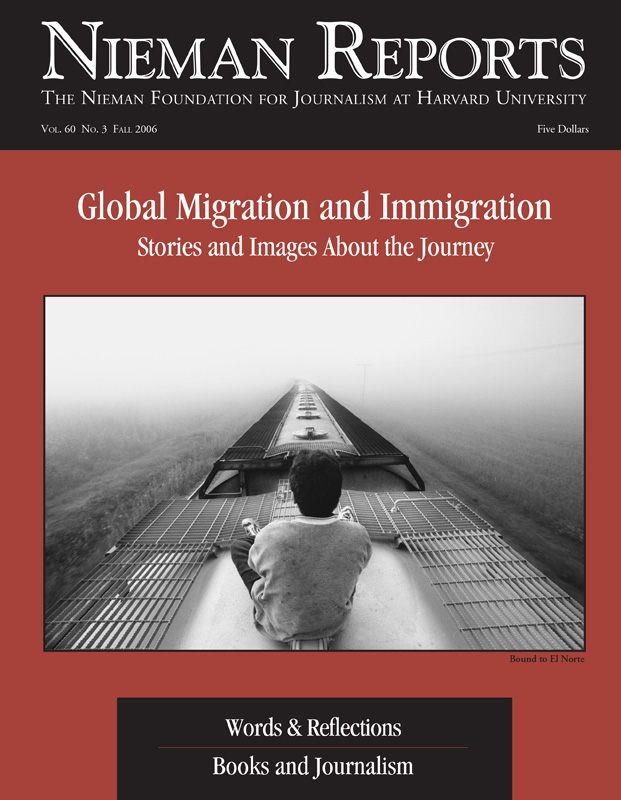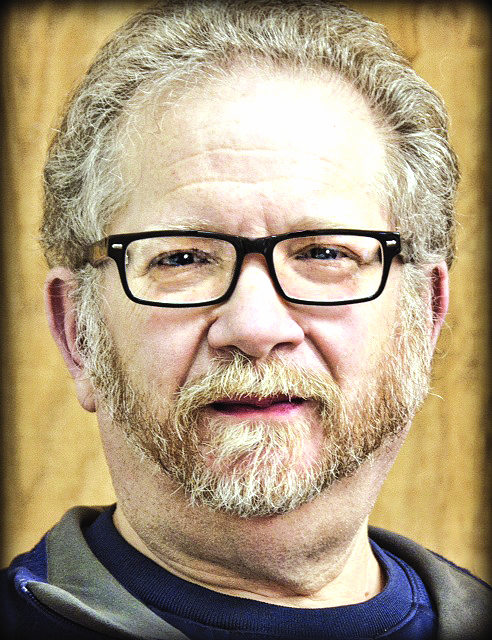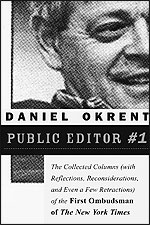In recent years, the ranks of the traditionally lonely American ombudsman — that unique journalist who functions as part complaint department/part internal affairs cop — have expanded with the addition of ombudsmen at institutions like NPR and PBS. (CBS’s new "Public Eye" online feature also fills a quasi-watchdog function.) Their stature and visibility have also increased thanks in part to Jim Romenesko’s decision to regularly include ombudsmen columns in his obsessively read media Web site.
But one of the most positive developments in the 39-year history of U.S. newspapers and ombudsmen (and women) emerged from the debris of the disastrous Jayson Blair scandal at The New York Times in 2003. In one of Bill Keller’s first acts as executive editor, he reversed the Times’s long-standing and public resistance to the concept of hiring an outside monitor to evaluate the paper. Instead of this person being an ombudsman, the title he gave to the person who would assume this unenviable role was "public editor." And Keller also made a surprising choice, picking a gifted writer and something of a Renaissance man, but someone who hadn’t actually worked at a newspaper since his college days.
When the Times came calling, Dan Okrent’s reputation was that of a distinguished author and veteran magazine journalist, having spent a good chunk of his career as an editor at Time Inc. In certain circles, he is best known as the founder of "Rotisserie" or fantasy baseball, a game that has turned a generation of middle-aged men into make-believe baseball executives and one that has spun off a series of related cottage industries. In considerably smaller circles, he is recognized as a crossword puzzle addict, a devotee of many forms of music, and a pretty serious food aficionado.
Okrent has admitted to suffering from one outbreak of last-minute panic and second-guessing after taking the Times job. Little wonder. Being the paper’s first public editor was certain to be a thankless task at a very proud — some might say arrogant — institution that houses a fractious and hypercompetitive internal culture. His every word of criticism or validation was sure to be … scrutinized and analyzed by many Times readers, Times workers and, of course, sworn Times haters. Still, he was well-suited for the test as an outsider, a short-timer (he signed on for only 18 months), and a very confident man who had already achieved considerable professional success.
Columns He Wrote
The first thing worth noting about "Public Editor #1: The Collected Columns (with Reflections, Reconsiderations, and Even a Few Retractions) of the First Ombudsman of The New York Times" is that it might be the only collection of ombudsman columns ever assembled that is a genuine page turner. That isn’t to denigrate the writing ability of other ombudsmen, but some of the more mundane aspects of the job — monitoring comic strips, wayward lottery numbers, headline snafus, and ink that comes off on the reader’s hand — don’t usually provide the fodder for bracing literary work. Okrent dutifully tackled some of these more routine topics by counting up the number of annual Times corrections, addressing concerns about listings, and fretting about inconsistent "overlines" in the paper. But his talents — abetted by the generous amount of space he was given — made almost every column he wrote a must read.
Who else would describe a series of flawed stories on Iraq’s alleged prewar stocks of weapons of mass destruction as "an ongoing minuet of startling assertion followed by understated contradiction"? Or accuse ethically shaky columnists of relying on "indirection and innuendo, nestling together in a bed of lush sophistry"? Or note that a Times edition from yesteryear contained the "obituaries of 24 luminaries of very faint wattage"? In his "Public Editor #1" review for The New York Times, Harold Evans suggested such a silky touch could be a liability, noting that Okrent seemed "sometimes seduced by his own fluency, forsaking the cool judicial role for that of ‘watch me write a column.’"
But as someone who spent two years in the 1990’s as ombudsman at The Boston Globe, I can testify that much of the job is a tough, gritty slog; no one takes it on for the writing opportunities. In an aptly titled chapter called "Notes on An Unendearing Profession," Okrent recalls the words of Times publisher Arthur Sulzberger, Jr., at their first meeting: "Why on earth would you want to do this?"
Okrent went on to write his share of tough-minded, important and courageous columns. The most noteworthy occurred on May 30, 2004, when he broke his own rule not to revisit events that predated his tenure. In that column he examined how the Times — and then star reporter Judith Miller — managed during the run-up to the 2003 Iraq invasion to convince readers that Saddam Hussein "possessed, or was acquiring, a frightening arsenal of WMD." Okrent blamed a sweeping "institutional" failure and a "dysfunctional system" that failed to reign in reporters. Okrent’s decision to examine the Times’s failures in Iraq helped prompt Keller to beat him to the punch with an eyebrow-raising May 26, 2004 note to readers acknowledging that some coverage of the WMD issue "was not as rigorous as it should have been." Okrent’s critique carried more sting, as he called it "flawed journalism."
In another memorable column, Okrent answered the complicated and critical question posed by his headline "Is The New York Times a Liberal Newspaper?" in four pithy words — "of course it is." (In his final column, he acknowledged some regret about the language in that piece, admitting that he’d "reduced a complex issue to a sound bite.")
Writing About What He Wrote
In entertaining follow-ups appended to the original columns, "Public Editor #1" offers valuable insights into the newsroom reaction to his work, opening up a pretty wide window into the Times’s churning internal machinations. To hammer home that point, Okrent, in a dishy introductory chapter that includes some score settling, bluntly described it as "a culture of complaint" and compared it to life inside a "kennel." (No one can accuse him of dull writing.)
Not all of Okrent’s work was a winner. Tackling what is arguably the most dangerous and inflammatory subject an ombudsman can handle — whether a paper’s coverage of the Middle East is biased — he penned an artful, nuanced piece that largely managed to duck the question. And a parting shot in his final May 22, 2005 piece that criticized columnist Paul Krugman for "shaping, slicing and selectively citing numbers" seemed below the belt and after the bell.
One thing for readers and everyone else to keep in mind is that Okrent was no ordinary ombudsman. He monitored America’s most powerful and most talked about newspaper, was provided with an unusually potent bully pulpit, and was liberated by his own status, ego and the realization that he would soon be back pursuing his passion for writing books.
In an unusual introductory column on December 7, 2003, for example, Okrent attempted to create intimacy with the readers by describing himself as "registered Democrat, but notably to the right of my fellow Democrats on Manhattan’s Upper West Side" and ticking off his views on everything from abortion to the New York Yankees. That kind of confessional might or might not have been a good idea. But the average ombudsman — planning to be on the job for years and understandably concerned about the importance of an image of sober judicial objectivity — wouldn’t have dared.
As incongruous as it sounds, Okrent was pretty much an ombudsman rock star, not one of the rank-and-file toiling away quietly trying to balance angry readers and touchy colleagues along with career aspirations. But the most important thing is that he was pretty damn fearless, usually wise, and always committed. And in an era when public skepticism and high-profile scandals have made it all the more important for news media outlets to promote transparency and engage in dialogue, his stint as "Public Editor #1" at the nation’s most important newspaper produced a high tide that lifted the boats of all ombudsmen.
Mark Jurkowitz, associate director of the Washington, D.C.-based Project for Excellence in Journalism, was for nearly two decades involved in covering the news media as press critic and author of the Boston Phoenix’s "Don’t Quote Me" column and at The Boston Globe, where he was ombudsman and then its first full-time media beat writer.




